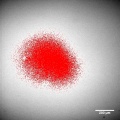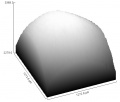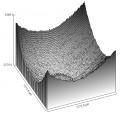ASC Field Illumination
From BioDIP
(Difference between revisions)
| Line 1: | Line 1: | ||
| − | The two images acquired via [[ASC Fluorescence and Brightfield Imaging|Fluorescence and Brightfield Imaging]] already gave an impression of the field illumination. Homogeneous illumination is particularly important for quantitative analysis, i.e. the comparison of intensities in different regions of the field of view. Therefore the following test provides a more quantitative analysis of the field illumination. | + | The two images acquired via [[ASC Fluorescence and Brightfield Imaging|Fluorescence and Brightfield Imaging]] already gave an impression of the field illumination. Homogeneous illumination is particularly important for quantitative analysis, i.e. the comparison of intensities in different regions of the field of view. Therefore the following test provides a more quantitative analysis of the field illumination. Reasons for the illumination not being in the center might be: |
| + | * lasers not coupled well into the fiber | ||
| + | * fiber not coupled well into the scan-head | ||
| + | * objective misaligned/damaged | ||
| + | * pinhole not centered | ||
| + | Due to that, it makes sense to not only test 10x objective + 488 nm laser, but also other combinations. Try to compare images with open vs. closed pinhole to check for the pinhole alignment. | ||
== requirements == | == requirements == | ||
* mirror slide | * mirror slide | ||
** alternatively: reflective surface (i.e. glass slide, gold-coated surface) | ** alternatively: reflective surface (i.e. glass slide, gold-coated surface) | ||
| + | ** for testing field illumination with immersion objectives, one should consider the use of the Leica Z-resolution mirror | ||
== acquisition == | == acquisition == | ||
| − | * | + | * set the laser of interest for illumination |
| − | * focus on reflective side of mirror | + | * set pinhole to 1 AU |
| − | * try to obtain "japanese flag" | + | * set up beam path for reflection (i.e. 80/20 splitter, AOBS in reflection mode) |
| + | * focus on reflective side of the mirror | ||
| + | * try to obtain "japanese flag"-like image | ||
| + | == analysis == | ||
| + | * Is the illumination centered well? | ||
| + | * How big are the differences in intensity between center and edges? | ||
== images == | == images == | ||
<gallery> | <gallery> | ||
Revision as of 16:03, 30 September 2009
The two images acquired via Fluorescence and Brightfield Imaging already gave an impression of the field illumination. Homogeneous illumination is particularly important for quantitative analysis, i.e. the comparison of intensities in different regions of the field of view. Therefore the following test provides a more quantitative analysis of the field illumination. Reasons for the illumination not being in the center might be:
- lasers not coupled well into the fiber
- fiber not coupled well into the scan-head
- objective misaligned/damaged
- pinhole not centered
Due to that, it makes sense to not only test 10x objective + 488 nm laser, but also other combinations. Try to compare images with open vs. closed pinhole to check for the pinhole alignment.
requirements
- mirror slide
- alternatively: reflective surface (i.e. glass slide, gold-coated surface)
- for testing field illumination with immersion objectives, one should consider the use of the Leica Z-resolution mirror
acquisition
- set the laser of interest for illumination
- set pinhole to 1 AU
- set up beam path for reflection (i.e. 80/20 splitter, AOBS in reflection mode)
- focus on reflective side of the mirror
- try to obtain "japanese flag"-like image
analysis
- Is the illumination centered well?
- How big are the differences in intensity between center and edges?



